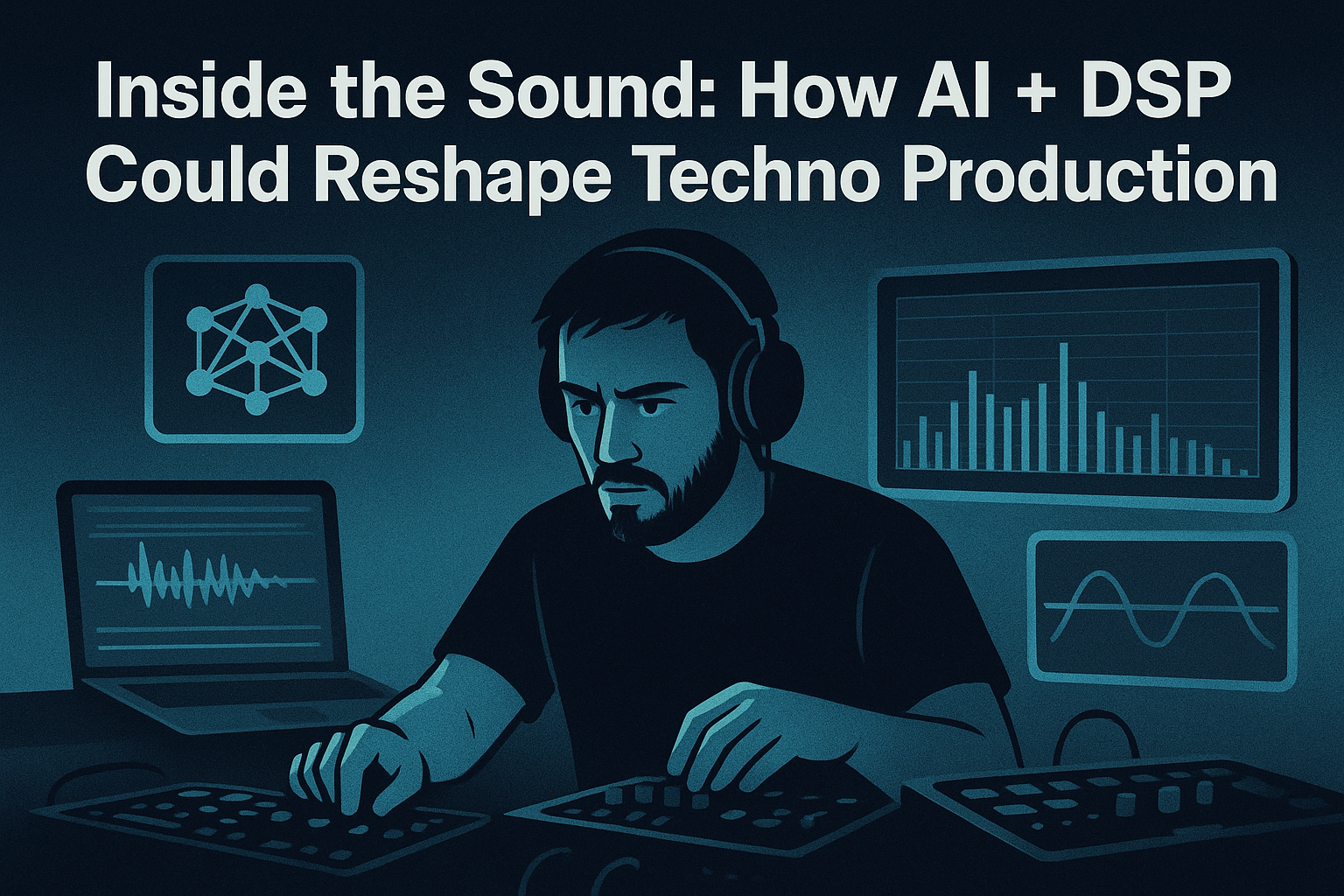035 - How AI + DSP Could Reshape Techno
Every producer knows the feeling: a loop that almost hits right, a kick that needs 2% more warmth, or a pad that’s haunting but not quite human. The space between “almost” and “perfect” is where technology keeps evolving, and where AI and DSP (digital signal processing) could take techno production next. This isn’t science fiction. The tools already exist; they just haven’t fully entered our workflows yet. But when they do, they’ll change how we listen as much as how we produce.
“Inside the Sound: How AI + DSP Could Reshape the Way We Make Techno” by GPT5
1. Pre-Processing: Listening at the Atomic Level
Imagine recording a field sound, like rain hitting metal, a train braking, for instance, and instantly breaking it into its microscopic frequencies. AI models could learn to separate noise from texture with uncanny precision. Instead of manually EQing or filtering, you could ask: “Keep the metallic transients, remove the low-frequency mud, and give me the airy reflections.” The machine wouldn’t just obey; it would understand what you mean. DSP has always been about sculpting frequencies; AI adds meaning. That combination could make pre-processing less about cleanup and more about sonic exploration.
2. Feature Extraction: Teaching Machines to Hear Like Humans
AI systems already extract “features” from audio, such as spectral brightness, harmonic richness, and transient energy. The next wave of producers will use that data creatively. You could search your entire sample library not by filenames, but by vibe. “Find me percussive sounds that feel mechanical but not cold.” The system could cluster kicks and textures by emotional tone, giving you new combinations that logic alone wouldn’t reveal. It’s like training a second pair of ears; one that never gets tired, never forgets, and keeps surprising you.
3. Generative Tools: Jamming with a Neural Network
Generative AI could soon become a true collaborator, not to replace producers, but to provoke them. You might feed a model your last ten drum patterns and let it generate hundreds of rhythmic variations, each subtly bending your own style. Or have it design evolving modulation curves that shift based on energy levels in your arrangement. Imagine jamming with an algorithm that listens back. A system that hears your groove, anticipates your next move, and suggests counter-rhythms you’d never program yourself. That’s not automation, fam, that’s dialogue.
4. Human Taste: The Final Algorithm
No matter how advanced the models become, the defining element remains taste. AI might propose a perfectly balanced mix, but it’s the producer who decides to leave the distortion, to stretch a snare off-grid, to let the kick clip slightly. That’s what gives a track identity. Machines can optimize sound. Humans chase feeling. The best producers of the next decade will be curators, fluent in both emotional resonance and algorithmic precision. They’ll know when to listen to the machine, and when to mute it.
5. Soul in the Signal
Techno was born from technology, such as drum machines, sequencers, and samplers, but it’s always been about emotion, not equipment. AI doesn’t change that. It just adds a new instrument to the rig. When we train algorithms on rhythm, we’re teaching machines to feel patterns. When we shape the outputs with taste and restraint, we’re reminding them where feeling ends and soul begins. The future won’t be man or machine. It’ll be music that lives between the two; think mechanical precision shaped by human imperfection.
MM, Initials, and a Closing Pulse
We’re not there yet. Most of these workflows still belong to researchers, experimentalists, and coders pushing at the edges of sound design. But the creative frontier is already visible. The next wave of techno won’t come from new plugins, but rather, it’ll come from new relationships between producers and algorithms. When that happens, “programming a track” might start to look a lot more like teaching a machine to groove.
Here is a cool joint by Ramon Tapia, called “DSP Enginge”:
Are you ready to explore how AI/ Machine Learning might fit into your music-making approach?
Do you have a budget and can peel away a bit for our retainer?
Holla at ya boy! (Appointment link is below)
Manish Miglani | Mani
==================
Techno Artist. AI Innovator. Building Sustainable Futures in Music, Space, Health, and Technology.
CEO & Co-Founder: MaNiverse Inc. & Nirmal Usha Foundation
Website: http://www.manimidi.com
My YouTube Channel: http://youtube.com/@djmanimidi
Book an Appointment: https://calendly.com/manish-miglani/30min
==================
QoTD: “Honesty is the first chapter in the book of wisdom." - Thomas Jefferson
